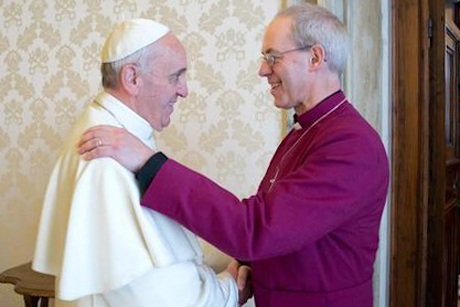The confusion surrounding the pope’s recent statement Fiducia Supplicans, a document that is ambiguous about whether Catholic clergy can bless those in same-sex relationships, says much about the times in which we live. Catholic theologians will argue that Rome has not changed, that the fog of distinctions contained in this latest statement means that it does not affect core Roman dogma. But that is not the point: The watching world cares nothing for such sophistry and sees here a fundamental cultural shift. And it seems naive to think that a fundamental change in pastoral practice will not lead to a significant transformation of attitudes. Such compromises—and this is most surely a compromise—always end up being far more sympathetic to the position they are moving toward than that from which they are moving away. When the pope sows chaos within his church on the matter of gay blessings, it is likely to affect us all—Catholic clergy and laity, certainly, but also us Protestants.
For Protestants (and likely many Catholics), this is a reminder that the papacy is not a cure-all for the alleged problems surrounding Protestant notions of scriptural sufficiency and clarity. Saint Paul promoted both the importance of Scripture and a church marked by ordained office for the preservation and transmission of the faith. Neither on its own can do the task by itself, and if Protestantism is vulnerable to not taking the church seriously enough, then a strong and hierarchical ecclesiology is vulnerable to generating its own forms of chaos. The system only has the competence and integrity of its leadership.
It would be easy in such circumstances to indulge in a certain Protestant triumphalism, as many Catholics now seem to face a conflict of conscience akin to that which Luther faced. Yet the problem is that the woes of contemporary Catholicism are not so easily separated from those of contemporary conservative Protestants at this point. Catholicism has for many years given us an umbrella under which we can shelter from the worst excesses of the broader culture. Whether it is the fight against abortion, intrusive health care mandates, or the imposition of political ideology through regulations governing adoption, the Catholic Church has led, and has had the financial power and cultural presence to do so in a way unavailable to Protestants. Strange to tell, she has also been able to maintain with relative impunity some positions that the broader culture finds intolerable among Protestants. Some years ago, my own appointment to the editorial board of an academic journal was almost vetoed because it was discovered that I belong to a denomination that does not ordain women. The objection was only withdrawn when it was pointed out to the complainant that other members of the same board were Catholics and thus members of a church with an all-male clergy.
Read it all at First Things




… [Trackback]
[…] Read More here: anglican.ink/2023/12/29/the-pope-same-sex-blessings-and-protestants/ […]